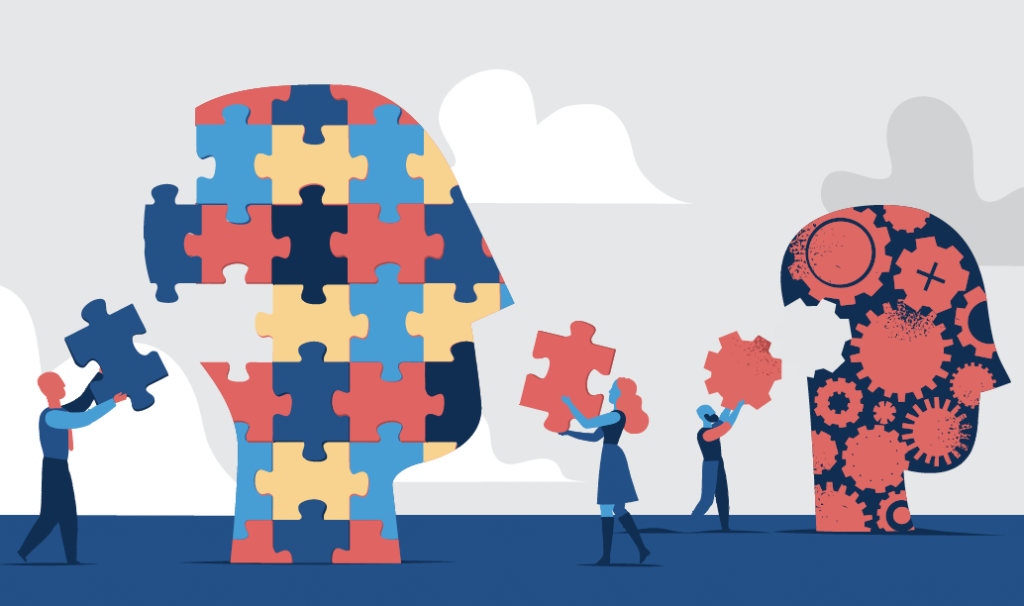This article was originally published in the Sep/Oct 2021 issue of San Diego Lawyer Magazine.
By Bhashini Weerasinghe

A favorite quote among gymnasts is: “Have the strength to hold on, and the courage to let go!” Simone Biles, the greatest gymnast of all time,[1] shocked the world when she dropped out of five of the six events she qualified for at the Tokyo Olympics this summer because of mental health concerns and a desire to put her team and her health above her ambition to compete.[2] Biles, who has been an inspiration to many, has yet again led the way to an important discussion on mental health, especially in high-pressure situations with demanding expectations.
Like in sports, we are accustomed in our profession to the persistent pressure to perform, and are often rewarded for our abilities to power through on adrenaline or coffee while we sacrifice our well-being to come out on top — whatever the goal may be. Success often requires leaning in and pushing ourselves to the brink without breaking.
While mental health is not often discussed, it is a growing concern in the legal field, drawing the attention of organizations such as the American Bar Association (ABA) and California Lawyers Association (CLA). According to the ABA, “61% of attorneys report anxiety issues at some point in their career,” with 28% and 19% reporting mild or higher levels of depression and anxiety, respectively.[3] These mental health issues have caused an alarming number of attorneys to seek unhealthy coping mechanisms such as problematic drinking (1 in 5), a problem that often starts early in the legal career and is thought to be driven by workload, pressure, and a need to compete.[4]
Another study showed that “25% of all women contemplated leaving the profession due to mental health concerns, compared to 17% of men.”[5] It’s long been documented that for a number of reasons, such as lack of support or interesting case assignments, microaggressions, and micro-inequities, the attrition rates for women of color are much, much higher.[6]
Often associated with this pressure for perfection is imposter syndrome: a phenomenon where an individual feels like a fraud and believes their successes were purely the result of luck. When asked why this syndrome is often associated with women and attorneys of color, Amy Gardner, a certified professional coach, commented, “This is due in part because [of] a lack of representation [that] can make minorities feel like outsiders.”[7] According to Gardner, “The combination of discrimination and imposter syndrome can result in higher stress levels and more negative mental health outcomes.”[8]
So, what can employers do? While those of us who pay attention to diversity and inclusion numbers know that the progress is slow to improve, one way that employers can help ensure we foster the talents of diverse young attorneys is to participate in programs such as the SDCBA-ACC Diversity Fellowship Program (DFP). The DFP chooses students through a holistic process based on their skills rather than law school name or GPA. It then provides students with mentors, and works with employers to give students tools early in their school career to help level the playing field and increase the number of diverse attorneys.
Learn more about the DFP and ways to participate in 2022 at www.sdcba.org/dfp.
Bhashini Weerasinghe (bw@bhashinilaw.com) is the owner of Law Office of Bhashini Weerasinghe, and Director of the SDCBA-ACC Diversity Fellowship Program.
- Biles is a two-time Olympian with seven Olympic medals, 25 World Championship medals, and has four moves named after her. https://www.teamusa.org/usa-gymnastics/athletes/simone-biles.
- Morse and Klosok, “Simone Biles: US Gymnast to Take Part in Tuesday’s Balance Beam Final at Tokyo 2020,” CNN Sports (Aug. 2, 2021) https://www.cnn.com/2021/08/02/sport/simone-biles-balance-beam-olympics-spt-intl/index.html.
- Bezrutczyk, Destiny, “Alcohol Abuse Among Lawyers and Legal Professionals,” (June 16, 2021), https://www.alcoholrehabguide.org/resources/alcohol-abuse-lawyers-legal-professionals/.
- Id.
- Anker and Krill, “Stress, Drink, Leave: An Examination of Gender-Specific Risk Factors for Mental Health Problems and Attrition Among Licensed Attorneys” (May 12, 2021), https://doi.org/10.1371/journal.pone.0250563.
- Debra C. Weiss, “Majority of Minority Female Lawyers Consider Leaving Law; ABA Study Explains Why,” ABA Journal (June 22, 2020), https://www.abajournal.com/news/article/most-minority-female-lawyers-consider-leaving-law-aba-study-explains-why.
- “Imposter Syndrome? 8 Tactics to Combat the Anxiety,” Around the ABA, ABA (Oct. 20218), https://www.americanbar.org/news/abanews/publications/youraba/2018/october-2018/tell-yourself-_yet–and-other-tips-for-overcoming-impostor-syndr/.
- Id.